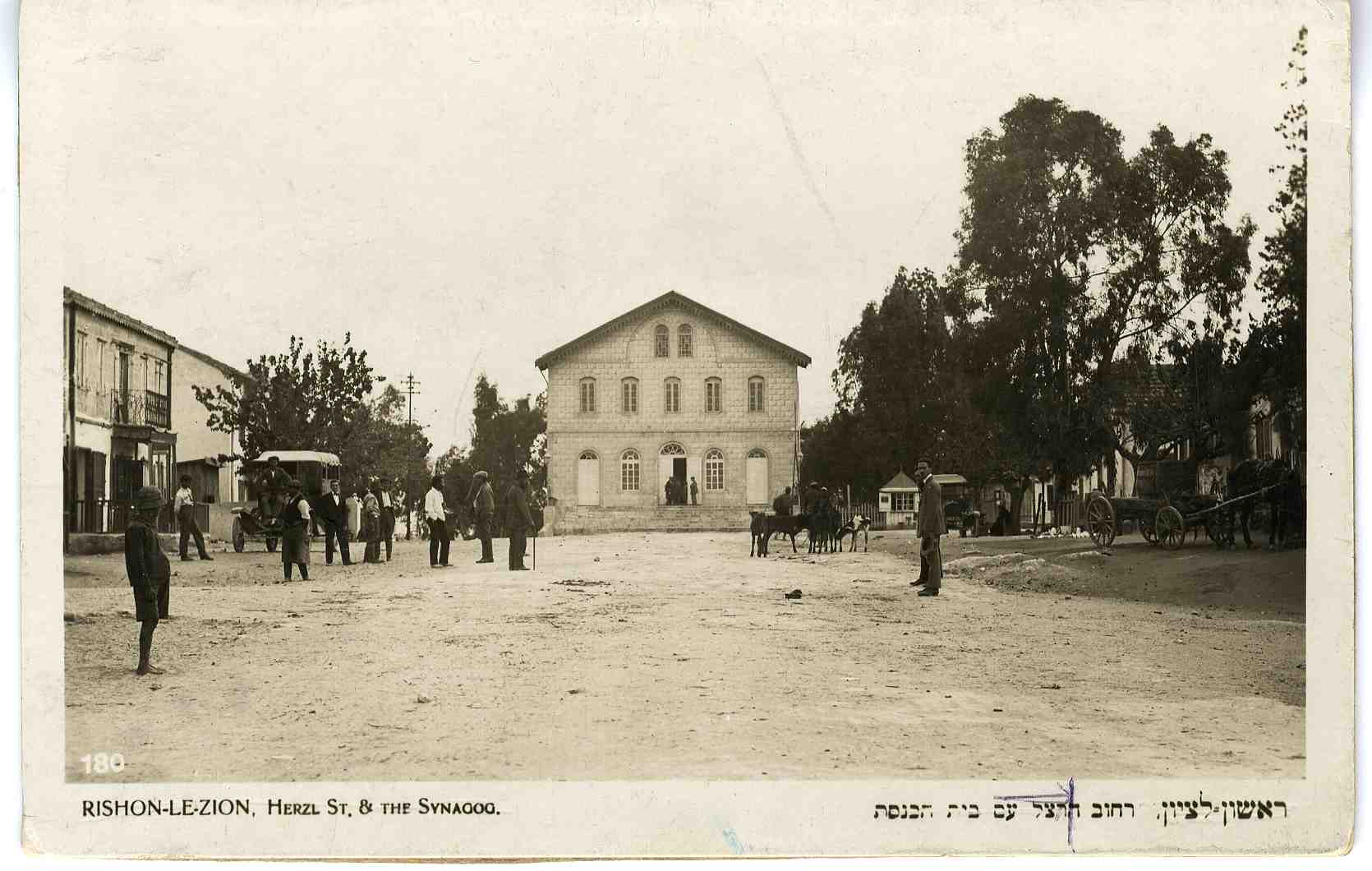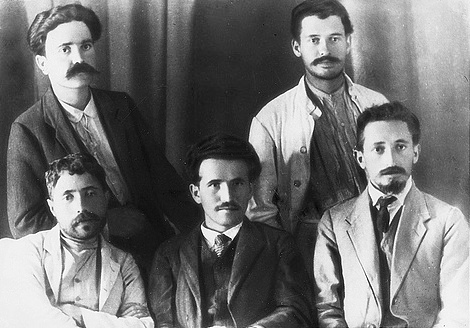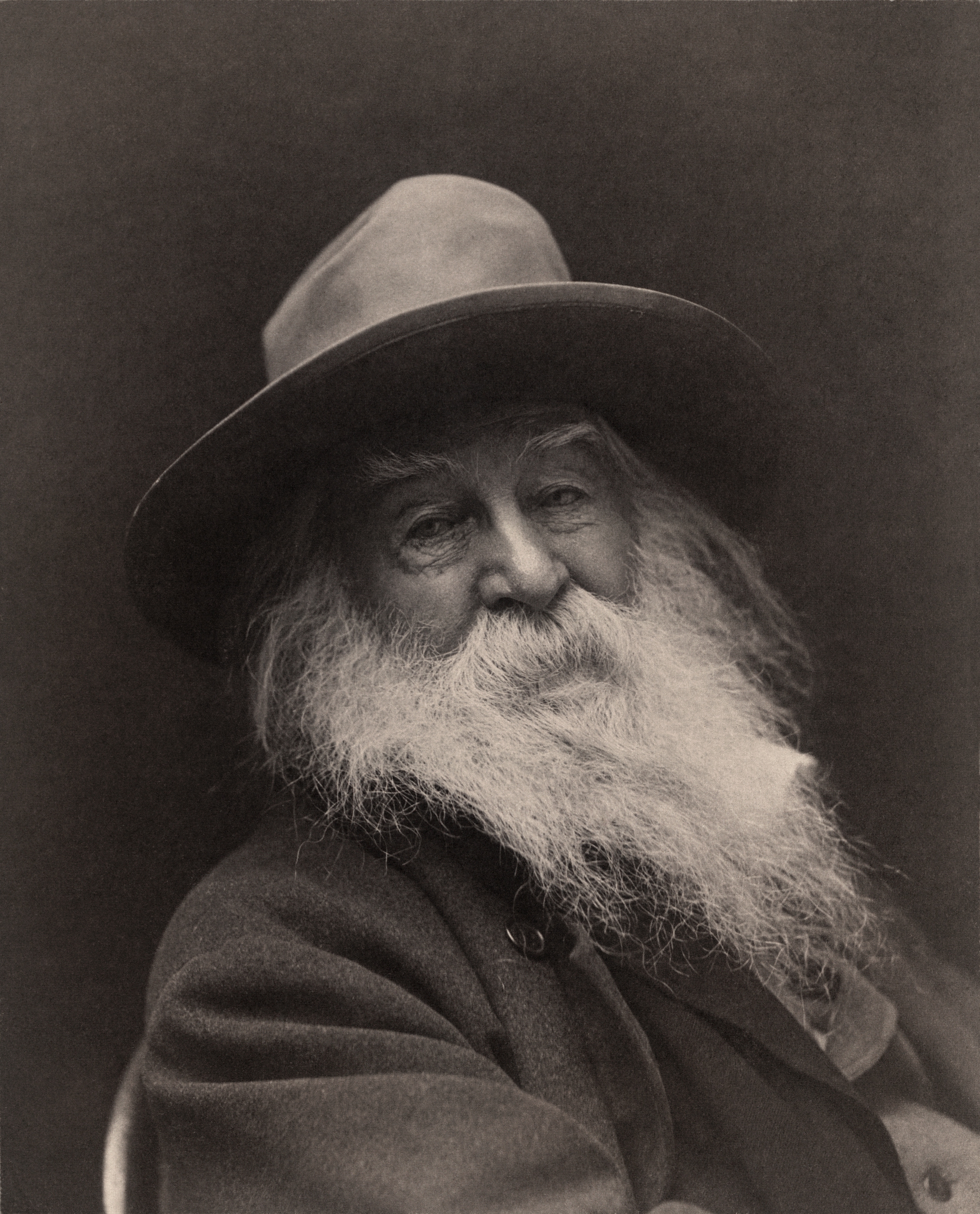|
Trumpeldor Cemetery
Trumpeldor Cemetery ( he, בית הקברות טרומפלדור), often referred to as the "Old Cemetery," is a historic cemetery on Trumpeldor Street in Tel Aviv, Israel. The cemetery covers 10.6 acres, and contains approximately 5,000 graves. History The cemetery was founded in 1902 on a tract of unoccupied land in Jaffa, six years before the founding of Ahuzat Bayit, the first neighborhood of Tel Aviv. Buried there are the city's founders, early residents, and cultural and historical figures, including Moshe Sharett, the second Prime Minister of Israel. After his death in 1920, the cemetery was named after Joseph Trumpeldor. When the cemetery opened, its location was far from populated areas but today it is located in downtown Tel Aviv, north of Trumpeldor Street, between Hovevei Zion and Zion Pinsker streets, where its three entry gates are located. The eastern gate is the oldest. The main gate (center) was opened in 1926 with the interment of the remains of Max Nordau. ... [...More Info...] [...Related Items...] OR: [Wikipedia] [Google] [Baidu] |
Yishuv
Yishuv ( he, ישוב, literally "settlement"), Ha-Yishuv ( he, הישוב, ''the Yishuv''), or Ha-Yishuv Ha-Ivri ( he, הישוב העברי, ''the Hebrew Yishuv''), is the body of Jewish residents in the Land of Israel (corresponding to the southern part of Ottoman Syria until 1918, OETA South 1917–1920, and Mandatory Palestine 1920–1948) prior to the establishment of the State of Israel in 1948. The term came into use in the 1880s, when there were about 25,000 Jews living across the Land of Israel and continued to be used until 1948, by which time there were some 630,000 Jews there. The term is still in use to denote the pre-1948 Jewish residents in the Land of Israel. A distinction is sometimes drawn between the Old Yishuv and the New Yishuv. The Old Yishuv refers to all the Jews living in the Land of Israel before the first Zionist immigration wave (''aliyah'') of 1882, and to their descendants who kept the old, non-Zionist way of life until 1948. The Old Yishuv resid ... [...More Info...] [...Related Items...] OR: [Wikipedia] [Google] [Baidu] |
Franz Kafka
Franz Kafka (3 July 1883 – 3 June 1924) was a German-speaking Bohemian novelist and short-story writer, widely regarded as one of the major figures of 20th-century literature. His work fuses elements of realism and the fantastic. It typically features isolated protagonists facing bizarre or surrealistic predicaments and incomprehensible socio-bureaucratic powers. It has been interpreted as exploring themes of alienation, existential anxiety, guilt, and absurdity. His best known works include the short story "The Metamorphosis" and novels ''The Trial'' and '' The Castle''. The term ''Kafkaesque'' has entered English to describe absurd situations, like those depicted in his writing. Kafka was born into a middle-class German-speaking Czech Jewish family in Prague, the capital of the Kingdom of Bohemia, then part of the Austro-Hungarian Empire, today the capital of the Czech Republic. He trained as a lawyer and after completing his legal education was employed full-ti ... [...More Info...] [...Related Items...] OR: [Wikipedia] [Google] [Baidu] |
History Of The Jews In The Czech Republic
The history of the Jews in the Czech lands, which include the modern Czech Republic as well as Bohemia, Czech Silesia and Moravia, goes back many centuries. There is evidence that Jews have lived in Moravia and Bohemia since as early as the 10th century. As of 2005, there were approximately 4,000 Jews living in the Czech Republic. Jewish Prague Jews are believed to have settled in Prague as early as the 10th century. The 16th century was a golden age for Jewry in Prague. One of the famous Jewish scholars of the time was Judah Loew ben Bezalel known as the Maharal, who served as a leading rabbi in Prague for most of his life. He is buried at the Old Jewish Cemetery in Josefov, and his grave with its tombstone intact, can still be visited. According to a popular legend, it is said that the body of Golem (created by the Maharal) lies in the attic of the Old New Synagogue where the genizah of Prague's community is kept. In 1708, Jews accounted for one-quarter of Prague’s pop ... [...More Info...] [...Related Items...] OR: [Wikipedia] [Google] [Baidu] |
German Language
German ( ) is a West Germanic languages, West Germanic language mainly spoken in Central Europe. It is the most widely spoken and Official language, official or co-official language in Germany, Austria, Switzerland, Liechtenstein, and the Italy, Italian province of South Tyrol. It is also a co-official language of Luxembourg and German-speaking Community of Belgium, Belgium, as well as a national language in Namibia. Outside Germany, it is also spoken by German communities in France (Bas-Rhin), Czech Republic (North Bohemia), Poland (Upper Silesia), Slovakia (Bratislava Region), and Hungary (Sopron). German is most similar to other languages within the West Germanic language branch, including Afrikaans, Dutch language, Dutch, English language, English, the Frisian languages, Low German, Luxembourgish, Scots language, Scots, and Yiddish. It also contains close similarities in vocabulary to some languages in the North Germanic languages, North Germanic group, such as Danish lan ... [...More Info...] [...Related Items...] OR: [Wikipedia] [Google] [Baidu] |
Max Brod
Max Brod ( he, מקס ברוד; 27 May 1884 – 20 December 1968) was a German-speaking Bohemian, later Israeli, author, composer, and journalist. Although he was a prolific writer in his own right, he is best remembered as the friend and biographer of writer Franz Kafka. Kafka named Brod as his literary executor, instructing Brod to burn his unpublished work upon his death. Brod refused and had Kafka's works published instead. In 1939, as the Nazis took over Prague, he emigrated to Mandatory Palestine, taking with him a suitcase of Kafka's papers, many of them unpublished notes, diaries, and sketches. Biography Max Brod was born in Prague, then part of the province of Bohemia in Austria-Hungary, now the capital of the Czech Republic. At the age of four, Brod was diagnosed with a severe spinal curvature and spent a year in corrective harness; despite this he would be a hunchback his entire life. A German-speaking Jew, he attended the Piarist school together with his lifel ... [...More Info...] [...Related Items...] OR: [Wikipedia] [Google] [Baidu] |
Yosef Haim Brenner
Yosef Haim Brenner ( he, יוֹסֵף חַיִּים בְּרֶנֶר, translit=Yosef Ḥayyim Brener; 11 September 1881 – 2 May 1921) was a Hebrew-language author from the Russian Empire, and one of the pioneers of modern Hebrew literature. Biography Yosef Haim Brenner was born to a poor Jewish family in , Russian Empire (today part of Ukraine). He studied at a yeshiva in Pochep, and published his first story, ''Pat Lechem'' ("A Loaf of Bread") in ''Ha-Melitz'' in 1900, followed by a collection of short stories in 1901. In 1902, Brenner was drafted into the Russian army. Two years later, when the Russo-Japanese War broke out, he deserted. He was initially captured, but escaped to London with the help of the General Jewish Labor Bund, which he had joined as a youth. In 1905, he met the Yiddish writer Lamed Shapiro. Brenner lived in an apartment in Whitechapel, which doubled as an office for ''HaMe'orer'', a Hebrew periodical that he edited and published in 1906–07. In 1922, ... [...More Info...] [...Related Items...] OR: [Wikipedia] [Google] [Baidu] |
National Poet
A national poet or national bard is a poet held by tradition and popular acclaim to represent the identity, beliefs and principles of a particular national culture. The national poet as culture hero is a long-standing symbol, to be distinguished from successive holders of a bureaucratically-appointed poet-laureate office. The idea and honoring of national poets emerged primarily during Romanticism, as a figure that helped consolidation of the nation states, as it provided validation of their ethno-linguistic groups. Most national poets are historic figures, though a few contemporary writers working in relatively new or revived national literatures are also considered "national poets." Though not formally elected, national poets play a role in shaping a country's understanding of itself. Some nations may have more than one national poet; the idea of a single one is always a simplification. It has been argued that a national poet "must write poetry that close ... [...More Info...] [...Related Items...] OR: [Wikipedia] [Google] [Baidu] |
Hayim Nahman Bialik
Hayim Nahman Bialik ( he, חיים נחמן ביאַליק; January 9, 1873 – July 4, 1934), was a Jewish poet who wrote primarily in Hebrew but also in Yiddish. Bialik was one of the pioneers of modern Hebrew poetry. He was part of the vanguard of Jewish thinkers who gave voice to the breath of new life in Jewish life. Being a noted essayist and story-teller, Bialik also translated major works from European languages. Although he died before Israel became a state, Bialik ultimately came to be recognized as Israel's national poet. Biography Bialik was born in , Volhynian Governorate in the Russian Empire to Itzik-Yosef Bialik, a scholar and businessman from Zhytomyr, and his wife, Dinah-Priveh. He had one older brother Sheftel (born in 1862) and two sisters Chenya-Ides (born in 1871) and Blyuma (born in 1875). When Bialik was 8 years old, his father died and his mother took him to Zhytomyr to live with his Orthodox grandfather, Yankl-Moishe Bialik. Bialik did not see his mot ... [...More Info...] [...Related Items...] OR: [Wikipedia] [Google] [Baidu] |
Knesset
The Knesset ( he, הַכְּנֶסֶת ; "gathering" or "assembly") is the unicameral legislature of Israel. As the supreme state body, the Knesset is sovereign and thus has complete control of the entirety of the Israeli government (with the exception of checks and balances from the courts and local governments). The Knesset passes all laws, elects the president and prime minister (although the latter is ceremonially appointed by the President), approves the cabinet, and supervises the work of the government, among other things. In addition, the Knesset elects the state comptroller. It also has the power to waive the immunity of its members, remove the president and the state comptroller from office, dissolve the government in a constructive vote of no confidence, and to dissolve itself and call new elections. The prime minister may also dissolve the Knesset. However, until an election is completed, the Knesset maintains authority in its current composition. [...More Info...] [...Related Items...] OR: [Wikipedia] [Google] [Baidu] |
Gideon Ben-Yisrael
Gideon Ben-Yisrael ( he, גדעון בן-ישראל, 6 March 1923 – 18 December 2014) was an Israeli politician who served as a member of the Knesset for Mapai and Rafi in the 1950s and 1960s. Biography Born in Haifa during the Mandate era, Ben-Yisrael joined the Haganah, and between 1938 and 1940 was a recruiting officer in Jerusalem. During World War II he volunteered for the Jewish Brigade, and following the war he helped to smuggle holocaust survivors into Palestine. He then fought in the 1948 Arab-Israeli War and was wounded in the Battle for Jerusalem. He was demobilised from the IDF as a major. After the war, he studied economics and international relations at the London School of Economics. He returned to Israel in 1953 and served as secretary of the Beersheba Workers Council, and was head of Labor Relations in the Ministry of Labour. He also lectured on labour relations at Tel Aviv University and the Hebrew University, and was a member of the co-ordinating committee ... [...More Info...] [...Related Items...] OR: [Wikipedia] [Google] [Baidu] |
Bernard Lewis
Bernard Lewis, (31 May 1916 – 19 May 2018) was a British American historian specialized in Oriental studies. He was also known as a public intellectual and political commentator. Lewis was the Cleveland E. Dodge Professor Emeritus of Near Eastern Studies at Princeton University. Lewis's expertise was in the history of Islam and the interaction between Islam and the West. Lewis served as a soldier in the British Army in the Royal Armoured Corps and Intelligence Corps during the Second World War before being seconded to the Foreign Office. After the war, he returned to the School of Oriental and African Studies at the University of London and was appointed to the new chair in Near and Middle Eastern history. In 2007 Lewis was called "the West's leading interpreter of the Middle East". Others have argued Lewis's approach is essentialist and generalizing to the Muslim world, as well as his tendency to restate hypotheses that were challenged by more recent research. On a poli ... [...More Info...] [...Related Items...] OR: [Wikipedia] [Google] [Baidu] |








